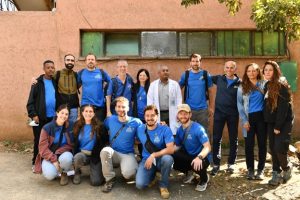
On November 20th, we celebrated Africa Industrialization Day, which was established in 1990, and is the day when a large number of African governments and organizations gathered to examine various different ways to stimulate industrialization in Africa.
Also in this week, Dr. Arkebe Oqubay, a leading thinker on African economic development, Minister and Adviser to the Prime Minister of Ethiopia, gave various talks in London on industrialization, economic transformation and China-Africa relations.
Dr. Oqubay highlighted that industrialization is vital for the African Continental Free Trade Agreement to succeed. He argued that, in contrast to Asia, the intra-regional value chain and trade volume is still very weak and constrained. The agreement will remove some inherent barriers for intra-continental trade. These barriers have caused many African countries to favor trade with European countries and other global counterparts, rather than with African nations.
The agreement will help goods produced in Africa move within the continent at negligible tariffs. This could be an advantage for industrial development and the advancement of industrialization. What needs to be explored here are the issues that are currently holding Africa back from developing its industry and becoming an industrialized continent. Is there a universal recipe for industrialization?
Many African countries try to learn from China’s developing experiences, and especially from China’s poverty reduction achievements and industrialization. These have been regarded as economic miracle, irrespective of where you stand politically.
Indeed, there might be some lessons that African countries could learn from China, but how can this be done, and what approach could be used?
Beijing has constantly invited many African government officials to China, especially to China’s special economic zone, to share its development and industrialization experience. This is an area that Chinese politicians are extremely proud of the nation’s achievement. However, this approach is somehow superficial, and is designed more like a tourist route or a ‘cultural learning trip’, adorned with fancy hotels and delicious Chinese food.
African government officials might have been productive in terms of learning using how to use chopsticks to eat fish, or developing a more vivid knowledge about China and its people, but can African government officials, who often do not have degree in economics or development studies really learn much through this type of trip? To be pragmatic, an evidence-based policy-making approach is needed, especially from African policy-makers perspective, in order for major changes and successes to be achieved.
What inspired me most from Dr. Oqubay’s talk was the way he undertakes policy-related research. As he pointed out, a fundamental issue related to policy learning is that African policy-makers may overlook China as a source of learning, and may fail to follow a systematic learning approach.
As a government official, practitioner and researcher who has been to China many times, he already knew that those quick and superficial official visits, starting from group welcome in the airport to having Chinese assistants looking after you at all times will not work. Thus, he requested a private trip to China, and used his personal passport rather than his diplomatic passport. This meant that he would really have opportunity and time to talk to the Chinese businesspeople and ordinary workers. With this approach, he would really be able understand the experience and challenges thay have faced.
In addition to visiting China, Dr. Oqubay and his research team also went to Nigeria, Madagascar and other African countries. This was because he believed that it was also important to learn the experiences from other African countries. This is because the methods and approaches that worked for China may not necessarily work for Africa. If Africa wants to develop its industry and drive the industrialization process forward, the first thing that African governments need to know is that there is no universal recipe for it, and the governments need to find their own recipe that fits their own unique circumstances. This requires solid research, experience sharing and knowledge transfer.
It might not be very realistic to expect that every African country has someone like Dr. Oqubay that works for the government and knows how to do high quality policy research. In fact, many African countries do not pay much attention to policy research. I have been to around 15 African countries in the past five years, and it is usually sad to see that most African think tanks are lack of funding and lack of staff. A striking example is that some of African counties’ national strategy plans only dependent on two or three researchers and sometimes they have to find someone who is based in the Global North to write such important plan.
This means that most African think tanks do not have the ability and capability to do evidence-based policy-oriented research, or to give constructive suggestions to the government. Thus, African agency becomes critical. A proper research environment with good incentives, together with a proactive, strategic and systematic approach are essential for industrialization, economic growth, encouraging innovation, together with creating new markets and jobs and —ultimately — reducing poverty.
About the author:
Hangwei Li is an award-winning journalist and a PhD candidate in Politics and International Studies at SOAS, University of London. She was also a researcher at the Global Policy Development Center and a predoctoral fellow at Harvard Kennedy School.
The Ethiopian Herald Sunday Edition 24 November 2019
By Hangwei Li (Sent to The Ethiopian Herald Sunday Edition)





